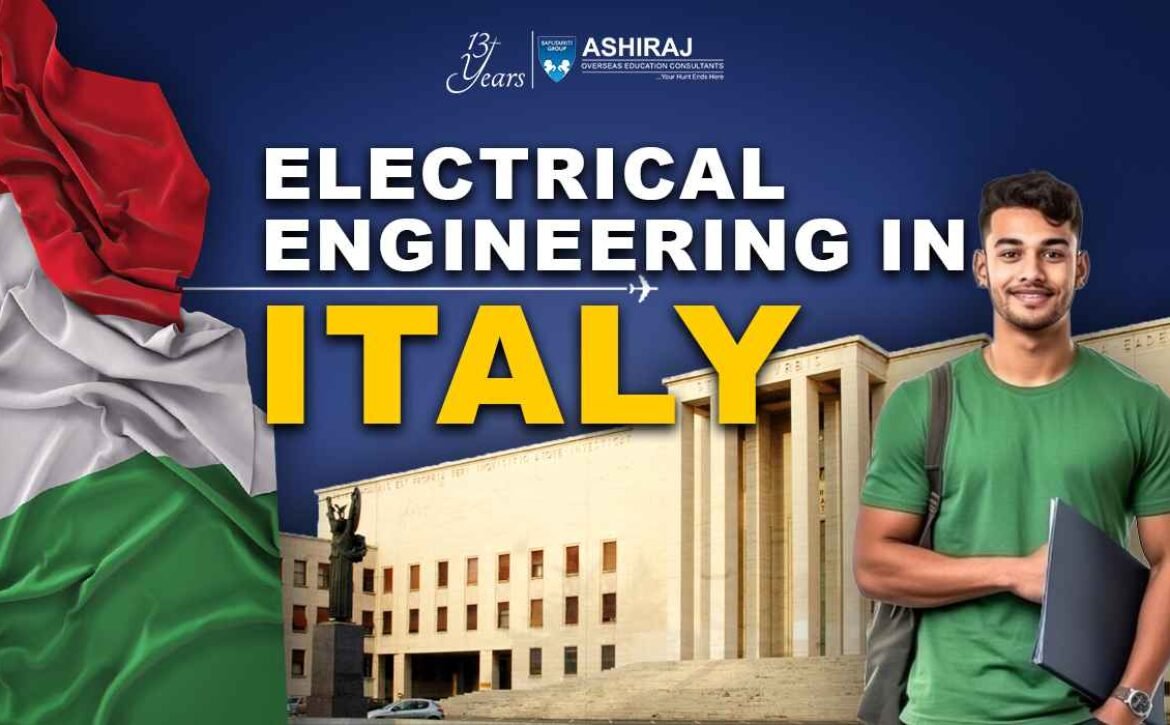
Electrical Engineering in Italy
Electrical Engineering in Italy offers a dynamic blend of tradition and innovation, attracting students with its rich academic heritage and cutting-edge research opportunities. Italian universities renowned for their excellence in engineering education, such as Politecnico di Milano and the University of Bologna, provide rigorous programs tailored to meet global industry demands. Students pursuing Electrical Engineering in Italy benefit from state-of-the-art facilities, robust industry collaborations, and a curriculum designed to foster creativity and technical expertise. With a strong focus on sustainable energy solutions and smart technologies, graduates are well-prepared to tackle the challenges of today’s rapidly evolving technological landscape.
Italy’s commitment to academic excellence in Electrical Engineering is reflected in its QS World University Rankings standings and the comprehensive support offered to international students, ensuring a vibrant and inclusive learning environment. Whether focusing on renewable energy systems or advanced electronics, studying Electrical Engineering in Italy equips students with the skills and knowledge necessary to make significant contributions to the field globally.
Why to Study Electrical Engineering in Italy?
- Academic Excellence: Italy boasts prestigious universities with strong reputations in Electrical Engineering, offering high-quality education recognized globally.
- Cutting-edge Research: Opportunities to engage in groundbreaking research initiatives in fields like renewable energy, telecommunications, and automation, supported by state-of-the-art facilities.
- Industry Collaboration: Access to collaborations with leading Italian and international companies, providing practical insights and potential internship opportunities.
- Cultural Experience: Studying in Italy offers a rich cultural experience, combining historic cities with modern innovation hubs, enhancing personal growth and global perspective.
- Multicultural Environment: Interaction with a diverse student body and faculty from around the world fosters a collaborative and inclusive learning environment.
- Career Prospects: Graduates of Italian Electrical Engineering programs are highly sought after by global employers due to their comprehensive skill set and academic credentials.
- Language Advantage: Opportunity to learn or improve proficiency in Italian, a valuable asset in the international job market and for networking within Italy’s engineering sector.
- European Union Membership: Italy’s EU membership facilitates mobility across Europe for further studies or work opportunities after graduation.
Top Universities to Study Electrical Engineering in Italy
University Name | QS World University Ranking 2023 | Type of University | Average Annual Fees | Programs Offered |
Politecnico di Milano | 167 | Public | €1,500 – €3,500 | Power Engineering, Electronics, Automation |
University of Bologna | 160 | Public | €1,000 – €3,000 | Telecommunications, Renewable Energy |
Sapienza University of Rome | 203 | Public | €1,200 – €2,800 | Electrical Systems, Control Engineering |
Politecnico di Torino | 215 | Public | €1,300 – €3,000 | Power Electronics, Communication Networks |
University of Padua | 301-350 | Public | €1,000 – €2,500 | Energy Systems, Signal Processing |
These universities are renowned for their academic excellence, research facilities, and strong industry connections, offering a diverse range of specializations in Electrical Engineering.
Course Curriculum for Electrical Engineering in Italy
- Core Subjects: The curriculum covers foundational courses in mathematics, physics, and computer science essential for understanding electrical systems and circuits.
- Specialized Tracks: Students can choose from specialized tracks such as power systems, electronics, telecommunications, and control systems, tailoring their studies to their career interests.
- Laboratory Work: Emphasis on practical skills through extensive laboratory work, allowing students to apply theoretical knowledge to real-world scenarios.
- Project-Based Learning: Opportunities for project-based learning where students collaborate to design and implement electrical systems, enhancing problem-solving abilities.
- Internship Opportunities: Many programs offer internships with industry partners, providing hands-on experience and networking opportunities.
- Elective Courses: Flexibility to choose elective courses in areas like renewable energy technologies, digital signal processing, and nanotechnology.
- Research Opportunities: Access to research projects that contribute to advancements in areas such as sustainable energy and smart grid technologies.
- Capstone Projects: Culminates in a capstone project where students demonstrate their mastery of skills and knowledge gained throughout the program.
Eligibility Criteria & Admission Requirements for MS in Electrical Engineering in Italy
- Academic Qualifications: Applicants must have completed a relevant undergraduate degree in Electrical Engineering or a related field from a recognized institution.
- Language Proficiency: Proficiency in English is required. Applicants typically need to provide either IELTS scores (minimum 6.0 overall) or TOEFL scores (minimum 80 iBT).
- Standardized Tests: Depending on the university, applicants may need to submit GRE (minimum scores vary by university) or GMAT scores (not always required for engineering programs).
- Passport & Student Visa: A valid passport and a student visa are necessary for international students intending to study in Italy.
- Academic Certificates: Official transcripts and certificates from previous educational institutions demonstrating academic performance and qualifications.
- Work Experience: While not always mandatory, some programs may prefer applicants with relevant work experience, especially for advanced or specialized programs.
Table: Standardized Test Scores
Test | Minimum Score |
IELTS | Overall 6.0 |
TOEFL | 80 iBT |
GRE | Varies |
GMAT | Not always required |
These criteria ensure that applicants are well-prepared for the rigorous academic demands of Electrical Engineering programs in Italy.
Documents Required for Studying Electrical Engineering in Italy
- Passport: A valid passport with a minimum validity of six months beyond the intended period of stay in Italy.
- Two Letters of Recommendation (LOR): Academic or professional references highlighting the applicant’s skills, achievements, and suitability for the program.
- Statement of Purpose (SOP): A personal statement outlining the applicant’s academic background, career goals, and reasons for choosing the specific Electrical Engineering program in Italy.
- Curriculum Vitae (CV): A detailed resume that includes academic qualifications, work experience, skills, and extracurricular activities.
- Official High School Transcripts: Transcripts from all previous educational institutions attended, demonstrating academic performance and qualifications.
- Certificates: Academic certificates or diplomas earned from secondary school and higher education institutions.
- Work Experience Certificate: If applicable, a document verifying any relevant professional experience in the field of Electrical Engineering.
- Proof of Financial Resources: Evidence of sufficient funds to cover tuition fees, living expenses, and other costs for the duration of study in Italy, such as bank statements or sponsorship letters.
These documents are essential for the application process, ensuring that candidates meet the criteria for admission to Electrical Engineering programs in Italy.
Admission Process for Electrical Engineering in Italy
- Research and Choose Universities: Research and identify universities in Italy offering Electrical Engineering programs that align with your academic and career goals.
- Check Eligibility Criteria: Review the university’s website for specific admission requirements, including academic qualifications, language proficiency, and standardized test scores (IELTS/TOEFL, GRE/GMAT).
- Prepare Required Documents: Gather necessary documents such as passport, academic transcripts, certificates, two letters of recommendation (LOR), statement of purpose (SOP), curriculum vitae (CV), work experience certificate (if applicable), and proof of financial resources.
- Submit Online Application: Complete the university’s online application form, ensuring all sections are filled accurately and deadlines are met.
- Pay Application Fee: Process the application fee payment as required by the university.
- Attend Interviews (if required): Some universities may conduct interviews as part of the selection process to assess candidates’ suitability for the program.
- Wait for Admission Decision: After submitting your application, wait for the university’s decision. This may take several weeks depending on the university’s review process.
- Acceptance and Enrollment: Upon receiving an offer of admission, accept the offer and follow the enrollment procedures provided by the university.
Following these steps ensures a smooth admission process to pursue Electrical Engineering studies in Italy, preparing you for a rewarding academic journey.
“Education is the most powerful weapon which you can use to change the world.”
Nelson Mandela
Cost of Electrical Engineering Course in Italy
- Tuition Fees: Average annual tuition fees for Electrical Engineering programs in Italy range from €1,000 to €3,500, depending on the university and program level.
- Living Expenses: Estimated living costs vary by city but typically range from €800 to €1,200 per month, covering accommodation, food, transportation, and other personal expenses.
- Books and Supplies: Additional costs for books, stationery, and laboratory supplies may amount to approximately €500 to €800 per year.
- Health Insurance: International students may need to purchase health insurance, costing around €300 to €600 per year, depending on coverage.
- Miscellaneous Expenses: Includes visa fees, residence permit fees (if applicable), and leisure activities, totalling approximately €500 to €1,000 per year.
- Scholarships and Financial Aid: Various scholarships, grants, and financial aid opportunities are available to help offset tuition and living costs for eligible students.
- Part-time Work Opportunities: International students can work part-time (up to 20 hours per week) during term-time and full-time during holidays to supplement their finances.
Understanding these costs helps prospective students budget effectively for their studies in Electrical Engineering in Italy, ensuring a financially sustainable experience.
Scholarships for Electrical Engineering Courses in Italy
Scholarship Name | Amount | Application Deadline |
Italian Government Scholarships | Varies | Varies (typically March-April) |
University-specific Scholarships | €1,000 – €5,000 per year | Varies by university (check respective websites) |
Erasmus+ Scholarships | Varies | Varies by call (typically February and October) |
Politecnico di Milano Scholarships | €2,000 – €6,000 per year | Varies (check university website) |
University of Bologna Scholarships | €3,000 – €7,000 per year | Varies (check university website) |
These scholarships provide financial assistance to international and domestic students pursuing Electrical Engineering studies in Italy. Applicants should check specific eligibility criteria, application procedures, and deadlines on the respective scholarship providers’ websites to ensure timely application submission.
Career Opportunities After Electrical Engineering in Italy
Job Profile | Average Salary |
Electrical Engineer | €35,000 – €50,000 per year |
Electronics Engineer | €30,000 – €45,000 per year |
Power Systems Engineer | €40,000 – €55,000 per year |
Control Systems Engineer | €38,000 – €52,000 per year |
Telecommunications Engineer | €32,000 – €48,000 per year |
These career paths offer graduates of Electrical Engineering programs in Italy opportunities to work in various industries, including manufacturing, telecommunications, energy, and research. The salaries vary based on factors such as experience, specialization, and the employing organization’s location and size.
Frequently Asked Questions About Electrical Engineering in Italy
Eligibility typically requires a relevant undergraduate degree, language proficiency (IELTS/TOEFL), and possibly GRE/GMAT scores. Documents like academic transcripts, LORs, SOP, CV, and proof of financial resources are also required.
Tuition fees range from €1,000 to €3,500 per year. Living expenses vary but generally range from €800 to €1,200 per month.
Yes, various scholarships such as government scholarships, university-specific scholarships, and Erasmus+ scholarships are available. Application deadlines and amounts vary.
Graduates can pursue careers as Electrical Engineers, Electronics Engineers, Power Systems Engineers, and more, with average salaries ranging from €30,000 to €55,000 per year depending on specialization and experience.
Yes, international students can work part-time (up to 20 hours per week) during term-time and full-time during holidays with a valid student visa.
Politecnico di Milano, University of Bologna, Sapienza University of Rome, Politecnico di Torino, and University of Padua are among the top institutions offering Electrical Engineering programs.
Typically, undergraduate programs take three years to complete, while master’s programs require an additional two years.
Most programs are offered in English, but learning Italian can be beneficial for daily life and integration into the local culture.
Students have access to research projects in areas like renewable energy, telecommunications, automation, and more, often collaborating with industry partners.
Admission can be competitive due to limited seats and high demand. Meeting eligibility criteria and submitting a strong application are crucial for successful admission.




